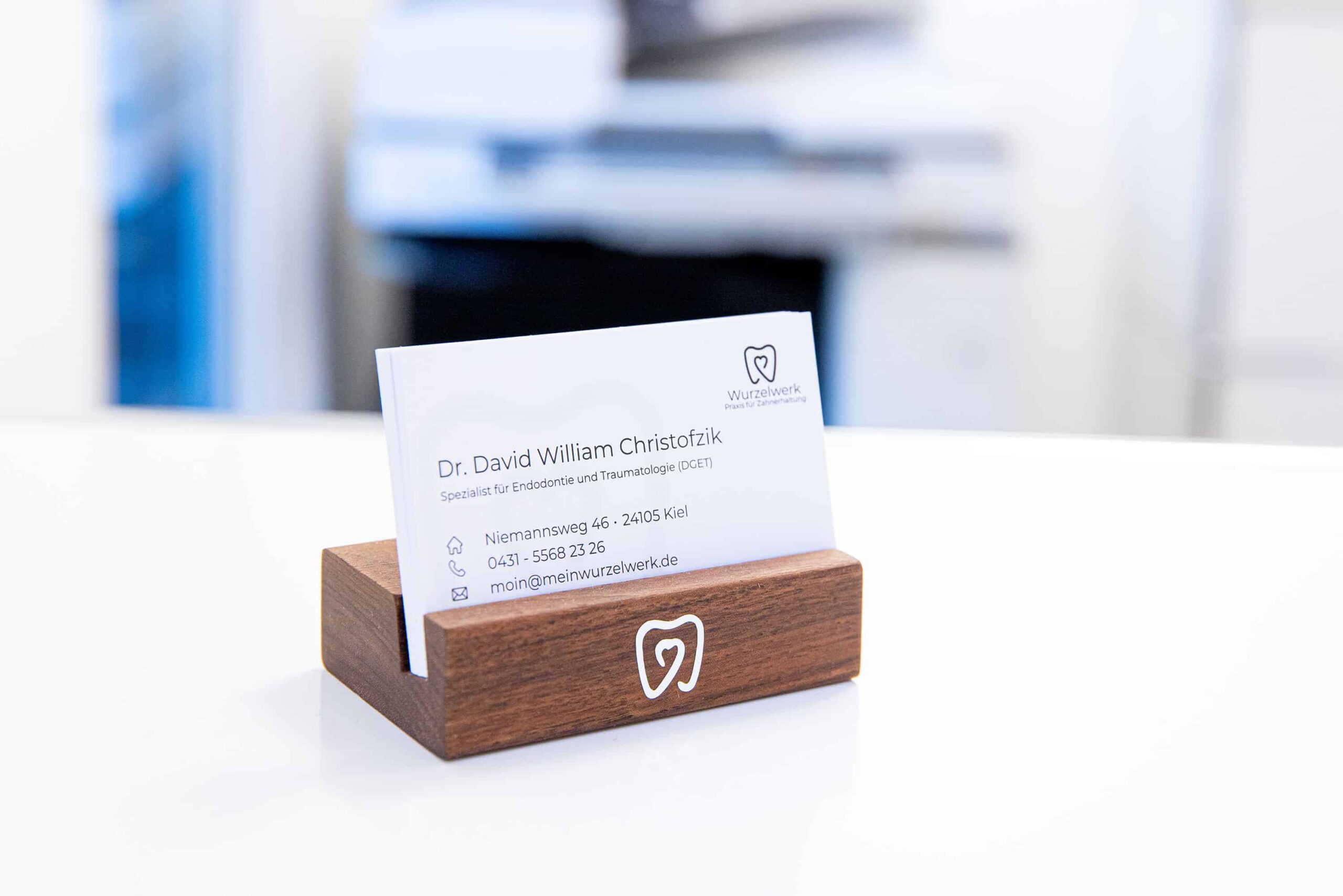Kiel dental practice
Root canal treatments
– Your dentist for microscopic root canal treatment
Appt.
Love for teeth
IS OFTEN THE SALVATION EVEN FOR SEVERELY DISEASED TEETH
Often, you have to literally get to the root of the problem, or the root canals. This is precisely one of our specializations at Wurzelwerk in Kiel. Root canal treatment, or endodontic treatment (endodontics), may be necessary to preserve an infected patient’s own tooth – this is accomplished through the use of the latest technology and years of advanced training in the field of endodontics.
Preserving teeth – for a lifetime
With very rare exceptions, almost all teeth can be root canal treated and thus preserved for life. Even previously treated teeth are no exception, the revision of root canals is part of our daily practice.
State of the art technology
By using the most current treatment strategies with care, precision, and our specialization in the field, we will always do our best to preserve your tooth. Because we are convinced that no artificial replacement (e.g. an implant) is better than your own tooth.

When does root
canal treatment have to be performed?
Endodontics
There are many reasons for the need of root canal treatment. Often, the inflammation is caused by bacteria that have invaded the pulp including the tooth nerve, via a caries. Once the bacteria have penetrated the tooth nerve, they cause an inflammation called pulpitis. Via the tooth root, this inflammation can spread to the root tip and eventually to the bone surrounding the tooth. This is referred to as apical periodontitis.
Stages of the disease
All phases of this disease process may be accompanied by various complaints, ranging from stabbing prolonged hot and cold sensations, spontaneous pain (especially at night), discomfort when biting down, sensitivity to tapping, to pulsating pain and swelling. However, it is not uncommon for there to be no symptoms at all and the diagnosis is made by chance on an X-ray.
Causes
In addition to caries, there is also the possibility of bacteria getting into the tooth nerve due to trauma (e.g. a fall) or leaking dental restorations (fillings or crowns).
Other possibilities are trauma (e.g. after grinding the teeth), a crack in the tooth (e.g. due to grinding or a fall) or even leaking filling and crown margins resulting in a cavity. In addition, deep fillings or crowns that are close to the canals very close to the tooth nerve (pulp or pulp) may also require root canal treatment.
Procedure of a
Root canal treatment
Modern root canal treatment has led to a steady increase in the success rate of tooth preservation over the last 20 years, and today almost every tooth can be preserved. Through the use of modern technology coupled with years of specialization in the field of endodontics, we often preserve your tooth for life.
01
Customized
Planning
At the first appointment, we will discuss with you the course of treatment tailored to you and take any necessary X-rays. Since each tooth is unique, accurate treatment planning is critical to the success of the treatment.
02
Treatment through a keyhole
The following treatment session starts with the removal of any existing caries on the tooth and a filling to prevent subsequent bacterial entry from the oral cavity into the root canal system. The entire treatment takes place under a rubber dam, which is similar to a surgical drape for the teeth. Through a precisely drilled hole (trepanation) – even through an existing dental crown – we obtain an overview of the existing root canal entries.
03
Preparation & Disinfection
Now follows the removal of the infected tissue from the tooth. The canal systems are measured electronically and additionally checked with X-rays. After intensive, varied rinsing to disinfect the cavities, the tooth is treated with an analgesic and disinfectant medication. Finally, the tooth is provisionally closed.
04
Stability for long-term success
During the last appointment of the treatment, the final root canal filling is inserted and the treated tooth is closed again with a ceramic resin filling. Only by providing this special filling, the tooth regains its stability and bacterial tightness. Provided in this way, lifelong tooth preservation is possible in almost all cases.
Glossary root canal therapy
A type of rubber cloth that isolates the tooth from the rest of the oral cavity. The rubber dam prevents medical solutions with which we irrigate the root canals from entering your mouth. Conversely, your natural oral bacteria do not reach the inside of the tooth.
The root canals have an average diameter of 0.1 mm. A microscope is necessary to recognize the variety of anatomical structures.
With the help of electronic resistance measurement it is possible to determine the lengths of root canals very precisely, you will not feel anything from the procedure. Only in this way is it possible to completely remove the bacteria.
Possibilities in micro-endodontics
“You can only treat what you see. And you can only see it if you know what to look for!”
- Preservation of almost all teeth
- Predictable results through detailed planning, including three-dimensional X-ray images (DVT)
- due to minimally invasive procedure, painless treatment possible in almost all cases
Frequently asked questions about root canal treatment
Is a root canal treatment painful?
No. By means of novel and highly effective drugs (anesthetics), such effective anesthesia can be given that a completely painless treatment is very often possible.
Even after the performed treatment, minimal discomfort is to be expected only in exceptional cases.
Why should the treatment be performed by a specialist in endodontics?
The treatment of root canals requires a high degree of experience, as each tooth has a unique anatomy. By specializing in root canal treatments over many years, it is possible to achieve a significantly higher probability of success. Furthermore, teeth can often be preserved that may be impossible to preserve by general dentists.
What is the advantage of root canal treatment over dentures?
We firmly believe that no dental prosthesis can be as good as nature itself. Root canal treatment is a promising and worthwhile treatment method and the only way to avoid a possible tooth extraction. The costs are calculable and in many cases much cheaper than dentures (e.g. implants or bridges) in case of tooth loss.
What is the prognosis of a treated tooth?
The success rate of a root canal treatment using our treatment methods is stated by the German Society for Endodontics (DGET) to be more than 90 percent on average.
As in all areas of medicine, no guarantee of 100% success can be given. If the tooth does not heal, further treatment steps such as an apicoectomy or removal of the tooth may be necessary.
Make an appointment
for root canal treatment
When can we be there for you?
You are welcome to call, write a message or make an appointment directly online:


© 2022 Wurzelwerk I Imprint I Privacy Policy I WEB-DESIGNED BY THINK-NEXT STUDIO





